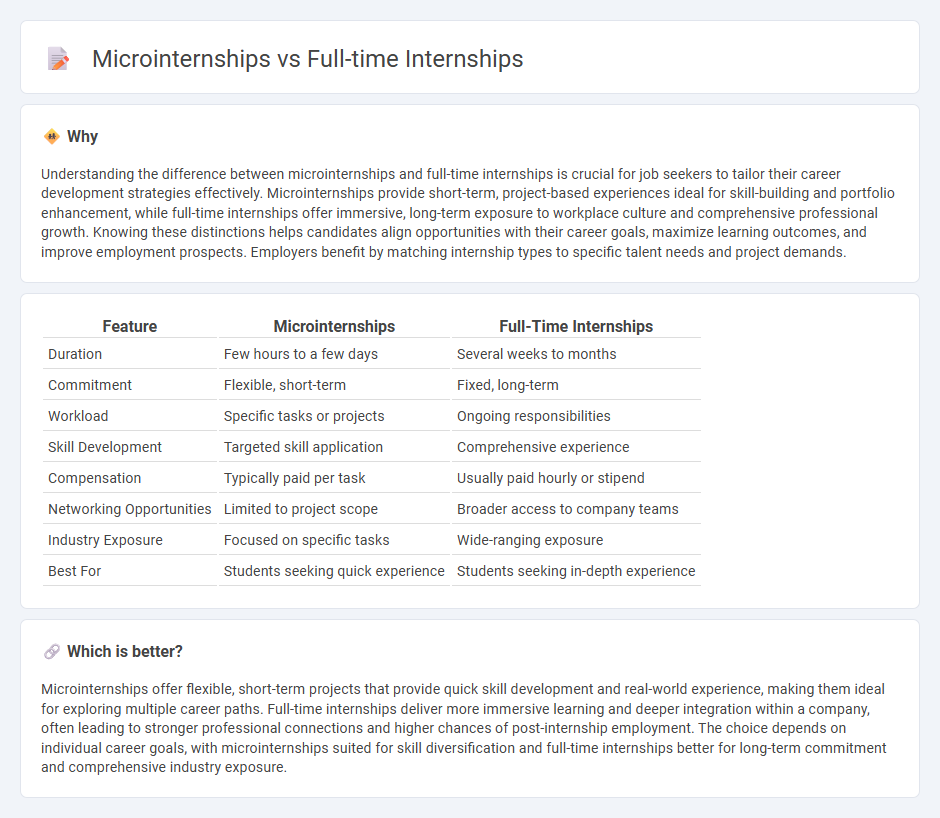
Microinternships offer short-term, project-based work experiences that allow students to gain practical skills and industry exposure without the long-term commitment of full-time internships. Full-time internships typically provide deeper immersion, structured training, and opportunities for sustained professional development over several months. Explore how each option can uniquely advance your career goals.
Why it is important
Understanding the difference between microinternships and full-time internships is crucial for job seekers to tailor their career development strategies effectively. Microinternships provide short-term, project-based experiences ideal for skill-building and portfolio enhancement, while full-time internships offer immersive, long-term exposure to workplace culture and comprehensive professional growth. Knowing these distinctions helps candidates align opportunities with their career goals, maximize learning outcomes, and improve employment prospects. Employers benefit by matching internship types to specific talent needs and project demands.
Comparison Table
| Feature | Microinternships | Full-Time Internships |
|---|---|---|
| Duration | Few hours to a few days | Several weeks to months |
| Commitment | Flexible, short-term | Fixed, long-term |
| Workload | Specific tasks or projects | Ongoing responsibilities |
| Skill Development | Targeted skill application | Comprehensive experience |
| Compensation | Typically paid per task | Usually paid hourly or stipend |
| Networking Opportunities | Limited to project scope | Broader access to company teams |
| Industry Exposure | Focused on specific tasks | Wide-ranging exposure |
| Best For | Students seeking quick experience | Students seeking in-depth experience |
Which is better?
Microinternships offer flexible, short-term projects that provide quick skill development and real-world experience, making them ideal for exploring multiple career paths. Full-time internships deliver more immersive learning and deeper integration within a company, often leading to stronger professional connections and higher chances of post-internship employment. The choice depends on individual career goals, with microinternships suited for skill diversification and full-time internships better for long-term commitment and comprehensive industry exposure.
Connection
Microinternships provide short-term, project-based experiences that help students build specific skills and gain practical insights, complementing the broader, immersive learning of full-time internships. These concise engagements often serve as stepping stones, allowing candidates to demonstrate capability and fit before committing to longer full-time roles. Employers increasingly use microinternships as a strategic talent pipeline to identify promising interns for subsequent full-time employment opportunities.
Key Terms
Duration
Full-time internships typically span several months, offering a comprehensive learning experience with in-depth project involvement. Microinternships are short-term, often lasting a few hours to a few weeks, designed for quick skill application and flexible participation. Explore further to understand which internship duration aligns best with your career goals.
Commitment
Full-time internships demand a substantial time commitment, often extending over several months with fixed working hours, allowing interns to gain deep, hands-on industry experience. Microinternships offer short-term, project-based opportunities requiring less time, suitable for those seeking flexible engagements or skill-specific tasks without long-term obligations. Explore the benefits and suitability of each to determine which commitment level aligns with your career goals.
Project Scope
Full-time internships typically involve extended commitments spanning several months where interns contribute to significant, multifaceted projects, allowing deep immersion in company workflows. Microinternships, usually short-term and task-specific, focus on discrete projects or deliverables that require minimal onboarding and flexible timing. Explore more insights on how project scope influences internship formats and candidate experiences.
Source and External Links
Opportunities for students at Fidelity - Fidelity offers full-time summer internships in multiple fields, many with strong potential for full-time roles after graduation, across areas such as technology, finance, human resources, and client relations.
Students and Graduates | FBIJOBS - The FBI offers full-time paid internships known as the Honors Internship Program, targeting undergraduate and graduate students, as a pathway to full-time employment, although current openings may vary.
Internship Programs | NASA - NASA's Pathways program provides paid full-time internships for current students and recent graduates, serving as a direct pipeline to federal employment with professional development and benefits.
 dowidth.com
dowidth.com